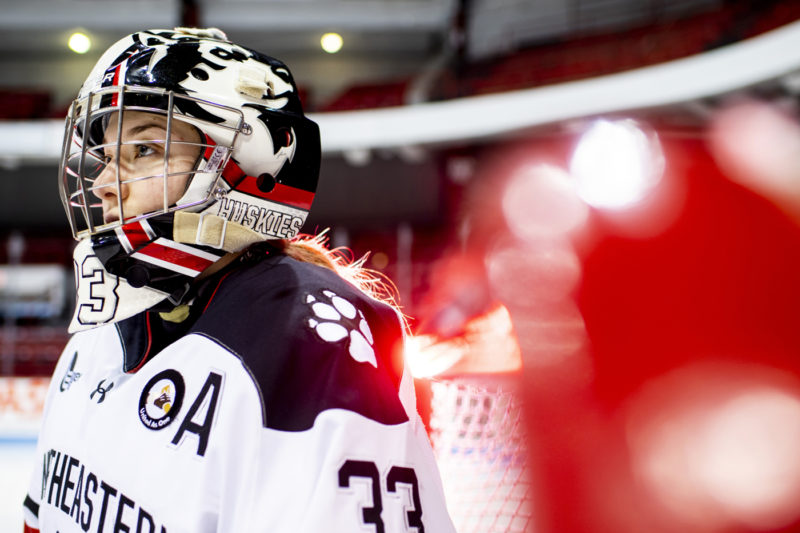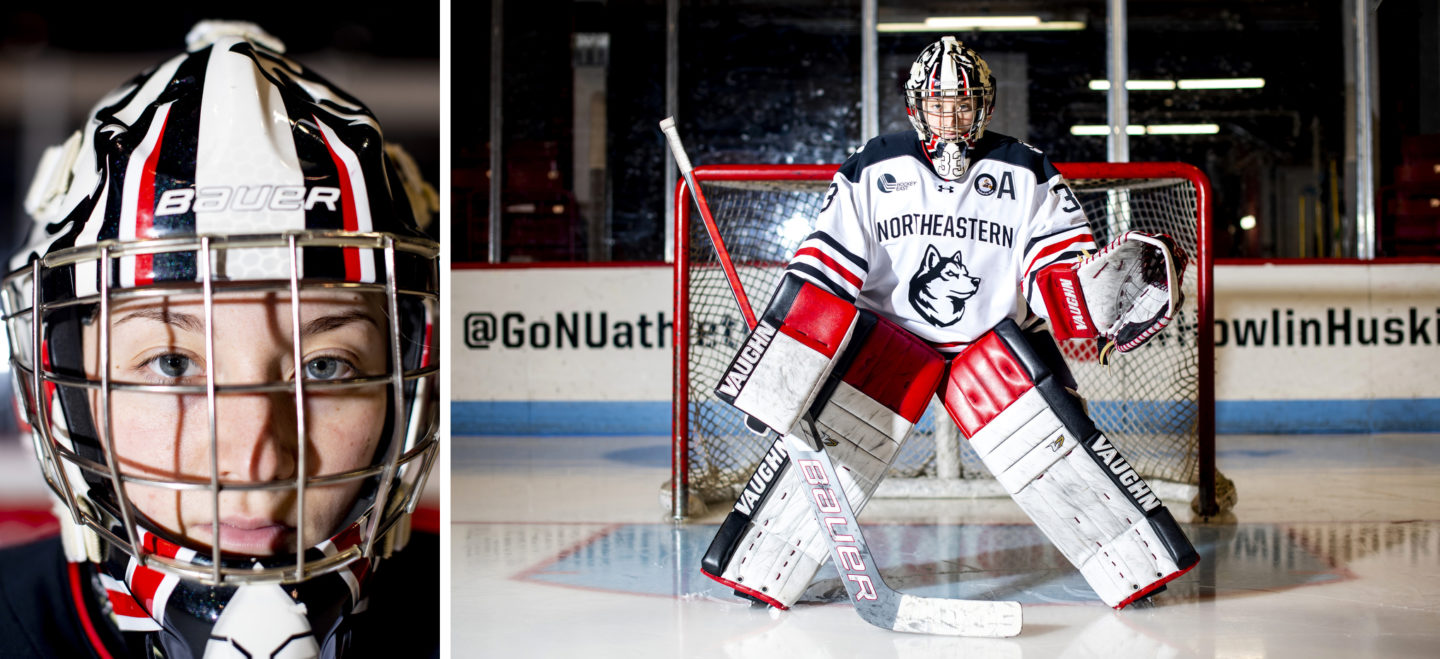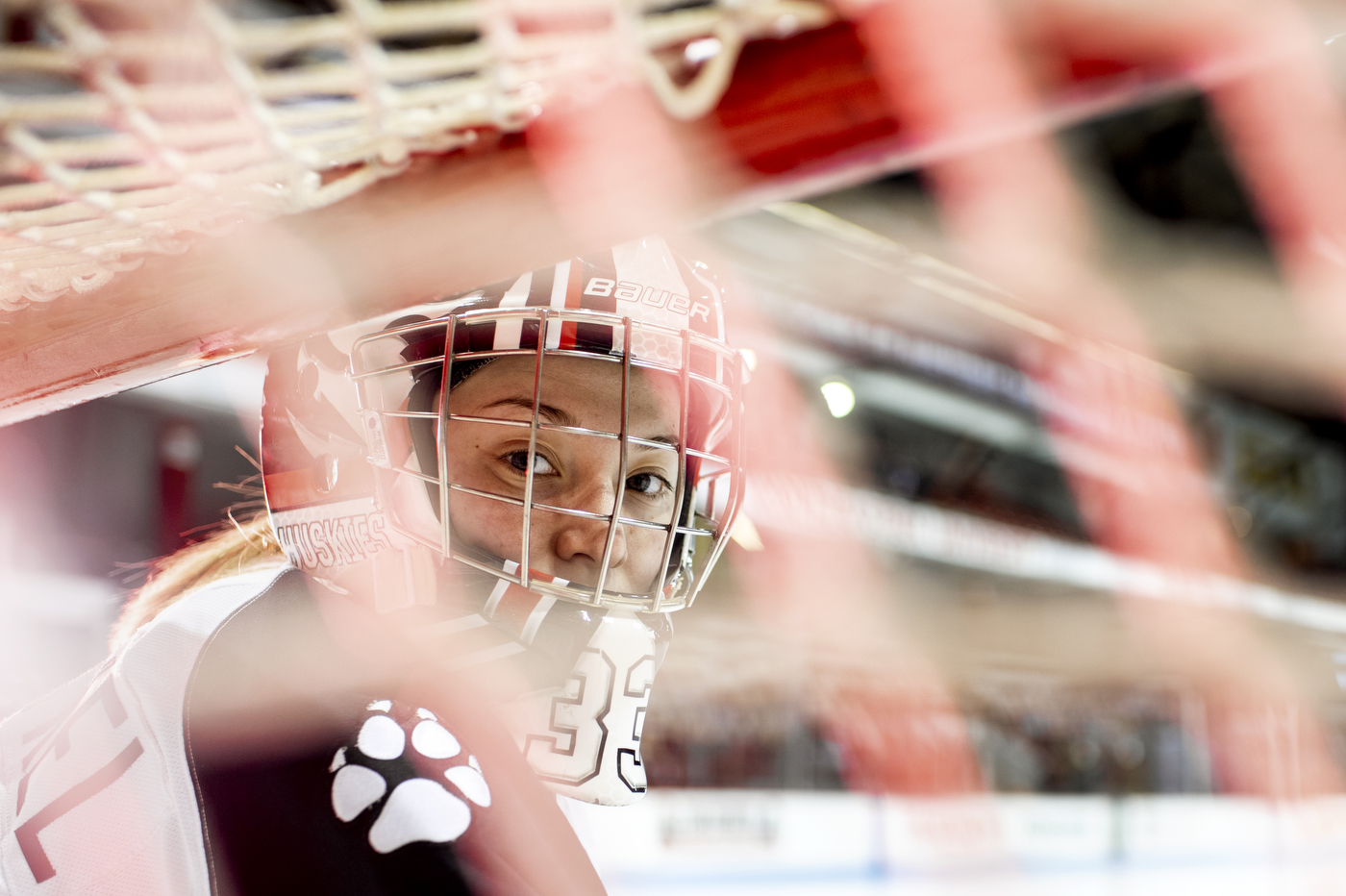
By: Ian Thomsen
So much depends on the goaltender, especially in big ice hockey tournaments. On Monday, Northeastern senior Aerin Frankel—an undersized underdog for much of her career—will be facing the biggest challenge of her career.
Her No. 1 Huskies (20-1-1) will open the eight-team NCAA Women’s Ice Hockey Championship as favorites to win the national title in Erie, Pa.
Frankel will be smiling.
“I’m excited, but I also feel calm and prepared,” Frankel says as she looks ahead to the NCAA quarterfinal Monday at 2 p.m. against No. 8 Robert Morris (16-7-1). “You can stress yourself out in the moments leading up to the game, but at the end of the day you just need to remember all the work that you’ve put in, and that’s why you are in that place. I just think that it’s not really worth stressing.”

Her confidence is affirmed by the records she has set at Northeastern, including her 76 victories and 28 shutouts. Hockey East recognized her as its top goaltender for the past three years, and as its current co-player of the year alongside teammate Alina Mueller, a junior forward. For the second straight season, Frankel is one of 10 finalists for the Patty Kazmaier national player of the year award. And she joins two competitors as finalists for NCAA Division 1 national goaltender of the year.
Northeastern has earned its first No. 1 ranking while maintaining an NCAA-best 20-game unbeaten streak, in no small part because Frankel has led the nation across the board—including nine shutouts, a .969 save percentage, a goals against average of 0.698, and 18 wins.
“Obviously, it’s a game with a little bit more at stake,” she says of the NCAA opener. “But how we prepare for it isn’t any different.”
Frankel’s success has been forged, in part, as a response to the obstacles she’s had to knock down along the way. She was not an A-level recruit coming out of high school, in part because she played for a powerhouse—Shattuck-Saint Mary’s of Minneapolis—that limited the number of shots she faced. Northeastern coach Dave Flint recruited Frankel based on the advice of her coach at Shattuck.

“Coach Flint saw potential in me, and that’s something that made me feel wanted here,” Frankel says. “I didn’t want to go somewhere where they didn’t really care if I came or not. I wanted to go where I was wanted.”
Frankel’s size dissuaded a lot of recruiters. At 5 feet 5 inches, she is small for her position.
“You see a lot of net when she’s in there,” Flint says. “Some coaches get enamored with tall goalies who take up a lot of net. I look for compete level and athleticism and do they stop pucks—and she checks all those boxes.
“But she’s been battling that her whole life. Everybody told her she’s too small. It gives her fuel to prove them wrong. And I think she’s proven a lot of people wrong.
“I think a lot of schools that passed on her are probably really regretting that now.”
Frankel turns her size into a strength by playing aggressively. She routinely steps out from the net to cut off angles and reduce opportunities—which means, of course, that she must react that much more quickly to the puck.
That’s why she doesn’t worry about making perfect saves. Rather, her focus is on making every save, however she can make it.
“One of my strengths is my ability to react,” she says. “Maybe I don’t always make it a clean save, but I get a piece of most shots that are taken at me.”
She laughs when asked if her hand-eye coordination has helped in other areas of her life.
“I get made fun of a little bit for not being that great at other sports,” Frankel says. “I’d like to say I’m about average, but my friends sometimes view me as just a goalie.”
Frankel takes a moment in the tunnel before the final against Providence College in the Hockey East Championship at Matthews Arena. Photo by Ruby Wallau/Northeastern University
Frankel grew up playing boys hockey in Chappaqua, N.Y. As a sophomore in high school, she made an investment in herself by transferring to Shattuck, a boarding school that deepened her commitment to hockey and empowered the sense of independence that every goalie needs.
“I was leaving home at a pretty young age, but I think that’s a sacrifice that a lot of young players make to put themselves in the best position to succeed and get committed to a Division 1 school,” Frankel says. “I think you do have to be all-in, and it’s not for everyone. I think everyone has times where they’re homesick, or they wish they could fly home to see their parents, but the hockey schedule doesn’t permit it.”
Frankel won the Northeastern starting job during a difficult freshman season in which the Huskies went .500 in conference play. Her breakthrough came in the Hockey East playoffs that year, when she won four straight one-goal games to help lead the Huskies to the NCAA Tournament. She and her fellow seniors recently completed a four-year sweep of Hockey East tournaments.
Frankel meets every Wednesday with Flint, himself a former goaltender who has helped her develop a sense for when to attack the play and when to stay back.
Frankel, who’s majoring in criminal justice and psychology, will be trying out later this year for the U.S. Olympic team. If she doesn’t make it, she plans to return to Northeastern next season by taking advantage of a temporary NCAA rule that affords an extra year of eligibility to players during the COVID-19 pandemic.
But those concerns are for another time. Nothing in her career has ever been more important than this opportunity. The week of her dreams has arrived.
“We’ve been waiting for this moment for a really long time,” she says. Not that it’s anything to be nervous about.
For media inquiries, please contact media@northeastern.edu.